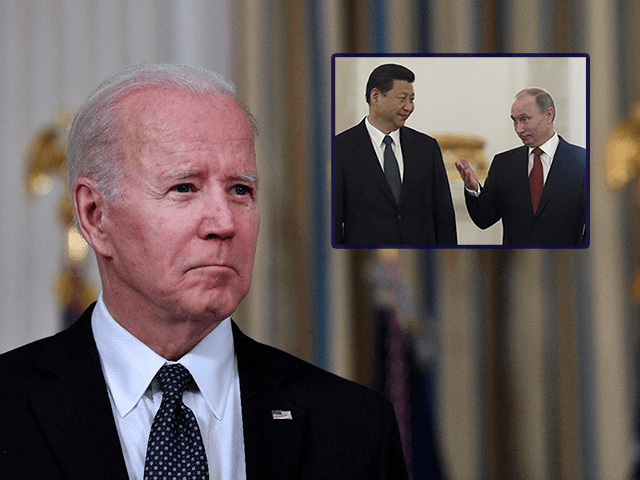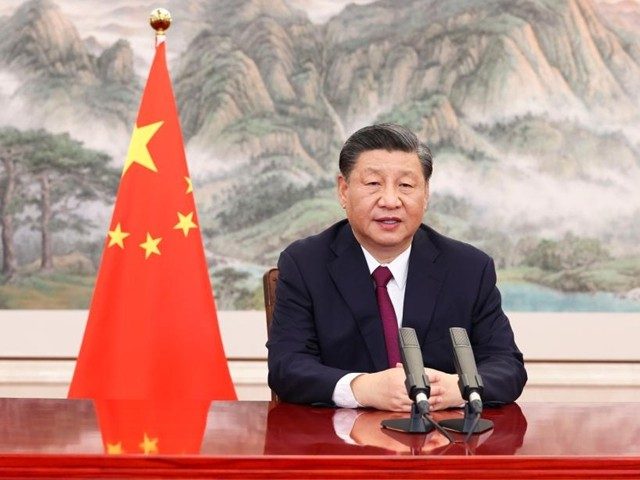Chinese communist dictator Xi Jinping urged the world on Thursday to join a vague “Global Security Initiative” in which individual states “oppose the pursuit of one’s own security at the cost of others’ security.”
Xi hailed the erosion of state sovereignty, both in the national security framework and economically, during a speech at the Boao Forum for Asia (BFA), an international conference the Communist Party holds annually. Xi, rarely seen in public since the Chinese coronavirus pandemic began, delivered a speech via video from an undisclosed location.
Xi equated the China-led “Global Security Initiative” to another Chinese project, the “Global Development Initiative,” and the Belt and Road Initiative (BRI), China’s global plan to offer predatory loans to poor nations that have resulted in economic catastrophe for participants.
According to an official transcript published on the site of the Chinese government-run Xinhua News Agency, Xi asserted that the ongoing Russian invasion of Ukraine was the product of an incorrect “Cold War mentality” – though he did not personally condemn Russian strongman Vladimir Putin for having such a mentality – and that the objective of the “Global Security Initiative” would be in part to prevent such conflicts. China has a decades-long alliance with Russia but has failed to fully support its full-scale war against the Ukrainian state. Chinese Foreign Ministry officials have not backed Putin’s claims that Ukraine has “no tradition” of being a sovereign state and rejected comparisons between Ukraine and Taiwan, another sovereign state that China falsely claims is a rogue province run by “separatists.”
Instead of choosing between Ukraine and Russia, China has branded the United States the main villain in the war.

President Joe Biden, China’s Xi Jinping (L), and Russia’s Vladimir Putin (R) (inset) (Nicholas Kamm/AFP, SERGEI KARPUKHIN/AFP/Getty Images)
Xi’s speech explained the “Global Security Initiative” in philosophical terms.
“It has been proven time and again that the Cold War mentality would only wreck the global peace framework, that hegemonism and power politics would only endanger world peace,” Xinhua quoted Xi as saying, “and that bloc confrontation would only exacerbate security challenges in the 21st century. To promote security for all in the world, China would like to propose a Global Security Initiative.”
“Security is the precondition for development. We humanity are living in an indivisible security community,” Xi continued. “I stay committed to respecting the sovereignty and territorial integrity of all countries, uphold non-interference in internal affairs, and respect the independent choices of development paths and social systems made by people in different countries.”
Xi demanded that states “stay committed to taking the legitimate security concerns of all countries seriously, uphold the principle of indivisible security, build a balanced, effective and sustainable security architecture,” as well as “oppose the pursuit of one’s own security at the cost of others’ security.”
“In today’s world, unilateralism and excessive pursuit of self-interest are doomed to fail; so are the practices of decoupling, supply disruption and maximum pressure,” he proclaimed, “so are the attempts to forge ‘small circles’ or to stoke conflict and confrontation along ideological lines.”
The Chinese dictator did not elaborate on what the “Global Security Initiative” would look like or what members would have to give to participate. He did not mention military exercises, sharing of military technology, intelligence-sharing, or any other specific activity typical to security alliances.
Xi appeared to be condemning all military alliances around the world that exclude any participant. Given the context of the Russian war, however, the remarks were likely a condemnation of the North Atlantic Treaty Organization (NATO), which has no substantive role in the war, as it has repeatedly rejected Ukraine’s overtures to join, leading Ukrainian President Volodymyr Zelensky to demand the U.S. Congress spearhead a new alliance that would welcome Ukraine.
The Global Times, an official propaganda newspaper of the Communist Party, enthusiastically embraced the “Global Security Initiative” without offering any more clarity on what it is.
“Analysts said the proposal was necessary and urgent amid rising concerns over the impact on global stability and the economy brought by the Ukraine crisis and attempts to build small cliques to create confrontation,” the Times proclaimed, citing its usual stable of Communist Party-approved “experts.”
“It urges countries to take overall security concept to avoid the Cold War mentality.”
One such expert, identified as academic Guo Yanjun, claimed the “Global Security Initiative” was “not unfamiliar” and offers “the Chinese approach to promote peace.” While not currently involved in any formal wars, China is currently perpetrating genocide on the Uyghur people of occupied East Turkistan, guilty of ethnic cleansing practices in Tibet, and running what human rights experts believe is a highly lucrative live organ trade in which officials kill prisoners of conscience to sell their hearts and other organs on the black market.
“The Global Security Initiative is a new proposal but its contents are not unfamiliar to us as these are the principles and concepts China has always practiced and proposed on building shared, comprehensive, cooperative and sustainable security,” Guo said.
“The Global Security Initiative aims to jump out of the confrontation to take an overall view on security issues among different countries and regions,” Guo elaborated.
Elsewhere in the speech, Xi heartily praised a regional military alliance China is a member of: the Association of Southeast Asian Nations (ASEAN).
“We should jointly promote Asian unity,” Xi said, presumably at the exclusion of the rest of the world. “We should cement ASEAN centrality in the regional architecture, and uphold a regional order that balances the aspirations and accommodates the interests of all parties.”
ASEAN has proven a problematic forum for China in the past decade as a result of the Communist Party illegally seizing islands and reefs belonging to fellow ASEAN nations, particularly the Philippines and Vietnam. People’s Liberation Army (PLA) forces have armed artificial islands on Philippine and Vietnamese reefs, causing significant environmental damage, and rejected a 2016 ruling by the Permanent Court of Arbitration at the Hague declaring the activity illegal.
Xi concluded on Thursday by warning any parties seeking the end of China’s 73-year-old communist rule that any attempt to do away with any world government would result in devastation.
“In this day and age, the international community has evolved so much that it has become a sophisticated and integrated apparatus. Acts to remove any single part will cause serious problems to its operation,” Xi asserted.

COMMENTS
Please let us know if you're having issues with commenting.